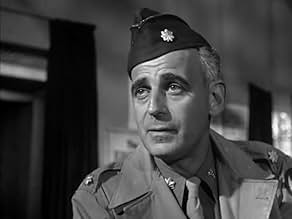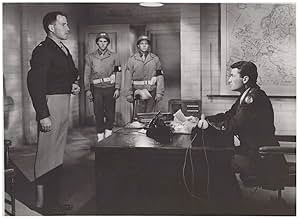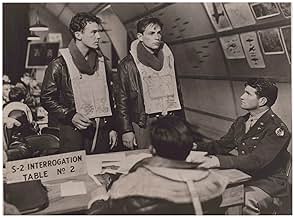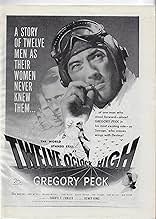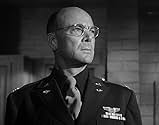Adicionar um enredo no seu idiomaA tough-as-nails general takes over a B-17 bomber unit suffering from low morale and whips them into fighting shape.A tough-as-nails general takes over a B-17 bomber unit suffering from low morale and whips them into fighting shape.A tough-as-nails general takes over a B-17 bomber unit suffering from low morale and whips them into fighting shape.
- Direção
- Roteiristas
- Artistas
- Ganhou 2 Oscars
- 9 vitórias e 5 indicações no total
- Lt. Bishop
- (as Bob Patten)
- Lt. Zimmerman
- (as Lee Mac Gregor)
- Officer
- (não creditado)
- Radio Operator
- (não creditado)
- Clerk in Antique Shop
- (não creditado)
- Operations Officer
- (não creditado)
- Mr. Britton
- (não creditado)
- RAF Officer
- (não creditado)
Avaliações em destaque
Following the intro with Dean Jagger, the action gets off to a good start with the B17 crash landing, a man staggering out to vomit, a reference to a wounded man's brain being visible and an account of Bishop's bravery. This is strong stuff for 1949.
It avoids a lot of war film clichés. There's no love interest (there's even a nod to the fact that the men weren't always faithful to their loved ones back home). There's no attempt to create a group of men who represent the breadth of society back home. You know the sort of thing - the New York cabbie, the young farm boy, the Texan, the idealistic schoolteacher, the journalist, the architect who's now bombing things that he once built. And it's about failure, it's about men destroying their bodies and their minds for something they don't understand. It reminds me of the colour-sergeant's reply to a soldier in Zulu, who asks 'Why us?'. 'Because we're 'ere, lad. Just us. Nobody else.' If I wanted to sound pretentious, I'd use the word 'existential'.
It's about leadership and is similar to Nortwest Passage. Both Spencer Tracy in that film and Peck in this are aware that they are putting on an act. One of the great scenes is Peck arriving at the base. He's sitting in the front of the car. They stop and Peck offers his driver, whom he calls 'Ernie', a smoke. He thinks for a while, then grinds out his cigarette, says, 'Right, sergeant.' His driver snaps open the rear door and Peck becomes the general. Northwest Passage again - Tracy says 'I'm not a man now, I'm an officer responsible for men. If you meet me when I'm just a man, you might have to use a little charity.' Other nice touches: the way the fur-lined RAF boots become the symbol of leadership. The way the real-life footage is dovetailed into the main action, a tribute to the war-time cameramen as much as the editor. Notice how they filmed detail like empty shells falling to the aircraft floor.
So how could a film about military leadership help a local government manager, of all people. I couldn't bust people or demote them easily, rearrange their duties with a stroke of the pen. I would have loved to set up a leper colony, but the union wouldn't let me. But Peck's stressing of the need for pride in one's group is something that can be transferred to any walk of life.
Você sabia?
- CuriosidadesThis film is used by the US Navy as an example of leadership styles in its Leadership and Management Training School. The Air Force's College for Enlisted Professional Military Education also uses it as an education aid in its NCO academies and Officer Training School. It is also used as a teaching tool for leadership at the Army Command and General Staff College and for leadership training in civilian seminars. It is used at the Harvard Business School as a case study in how to effect change in organizations.
- Erros de gravaçãoSavage is given command of the 918th and tells Pritchard that he'll get there "early" the next day. By the time he does arrive, Lt. Zimmerman has committed suicide, been given a funeral and Major Stovall has had time to get drunk afterwards.
- Citações
Major Stovall: That is not why I am drunk tonight. I got drunk because I am confused. I was thinking, which is a thing a man should not do, and all at once I couldn't remember what any of them looked like. I, I couldn't see their faces, Bishop, Cobb, Wilson, Zimmy, all of them. All of you. They all looked alike, just one face. And it was very young. It confused me. I think I shall stay drunk until I'm not confused anymore.
- Cenas durante ou pós-créditosOpening credits prologue: LONDON 1949
- ConexõesEdited into All This and World War II (1976)
- Trilhas sonorasDon't Sit Under the Apple Tree
(uncredited)
Music by Sam H. Stept
Lyrics by Charles Tobias and Lew Brown
Sung at the officers' club
Principais escolhas
- How long is Twelve O'Clock High?Fornecido pela Alexa
Detalhes
Bilheteria
- Faturamento bruto mundial
- US$ 4.499
- Tempo de duração
- 2 h 12 min(132 min)
- Cor
- Proporção
- 1.37 : 1



